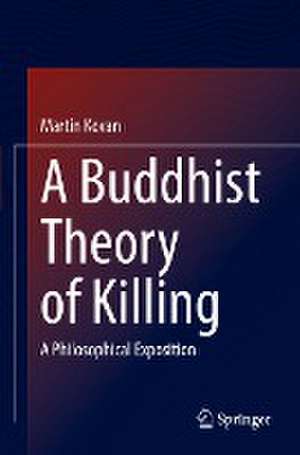A Buddhist Theory of Killing: A Philosophical Exposition
Autor Martin Kovanen Limba Engleză Paperback – 22 iun 2023
This book provides a philosophical account of the normative status of killing in Buddhism. Its argument theorises on relevant Buddhist philosophical grounds the metaphysical, phenomenological and ethical dimensions of the distinct intentional classes of killing, in dialogue with some elements of Western philosophical thought. In doing so, it aims to provide a descriptive account of the causal bases of intentional killing, a global justification and elucidation of Buddhist norms regarding killing, and an intellectual response to and critique of alternative conceptions of such norms presented in recent Buddhist Studies scholarship. It examines early and classical Buddhist accounts of the evaluation of killing, systematising and rationally assessing these claims on both Buddhist and contemporary Western philosophical grounds. The book provides the conceptual foundation for the discussion, engaging original reconstructive philosophical analyses to both bolster and critique classical Indian Buddhist positions on killing and its evaluation, as well as contemporary Buddhist Studies scholarship concerning these positions. In doing so, it provides a systematic and critical account of the subject hitherto absent in the field. Engaging Buddhist philosophy from scholastic dogmatics to epistemology and metaphysics, this book is relevant to advanced students and scholars in philosophy and religious studies.
| Toate formatele și edițiile | Preț | Express |
|---|---|---|
| Paperback (1) | 697.18 lei 6-8 săpt. | |
| Springer Nature Singapore – 22 iun 2023 | 697.18 lei 6-8 săpt. | |
| Hardback (1) | 702.78 lei 6-8 săpt. | |
| Springer Nature Singapore – 21 iun 2022 | 702.78 lei 6-8 săpt. |
Preț: 697.18 lei
Preț vechi: 820.21 lei
-15% Nou
Puncte Express: 1046
Preț estimativ în valută:
133.42€ • 138.50$ • 111.25£
133.42€ • 138.50$ • 111.25£
Carte tipărită la comandă
Livrare economică 24 martie-07 aprilie
Preluare comenzi: 021 569.72.76
Specificații
ISBN-13: 9789811924439
ISBN-10: 9811924430
Ilustrații: XXII, 254 p. 1 illus.
Dimensiuni: 155 x 235 mm
Greutate: 0.43 kg
Ediția:1st ed. 2022
Editura: Springer Nature Singapore
Colecția Springer
Locul publicării:Singapore, Singapore
ISBN-10: 9811924430
Ilustrații: XXII, 254 p. 1 illus.
Dimensiuni: 155 x 235 mm
Greutate: 0.43 kg
Ediția:1st ed. 2022
Editura: Springer Nature Singapore
Colecția Springer
Locul publicării:Singapore, Singapore
Cuprins
Chapter 1. General Introduction.- Part 1. Foundations: The Nature of the Problem.- Chapter 2. Introduction: Text and tradition: an overview of sources.- Chapter 3. Canonical Buddhist discourse on killing.- Chapter 4. Interpreting the precept: evaluative criteria in the Theravāda.- Chapter 5. Mahāyāna exceptionalism and the lethal act.- Chapter 6. Affect and cognition: unwholesome consciousness, hatred, wrong view, and delusion.- Chapter 7. Buddhist personhood and a doxastic rationale for killing.- Part 2. Constructions: The Nature of the Act.- Chapter 8. Critique of the conventional: the cessation of volition and Buddhist dualism of the person.- Chapter 9. Constituting the other: the conventional identity of persons.- Chapter 10. Persons as the objects of lethal justice.- Chapter 11. Killing and oblivion: the obviation of suffering.- Chapter 12. Representational persons: identity as the object of killing.- Chapter 13. Conclusion: Buddhist violence, self-defence, and the end of life.
Notă biografică
Martin Kovan graduated with a PhD. (Philosophy) at University of Melbourne in 2020. He has held exchange and visiting scholar positions at the National University of Singapore (Singapore), UC Davis (Davis, California), Mahidol University (Bangkok) and the Vrije Universiteit (Amsterdam). He also holds an M.Phil. in Buddhist Studies (University of Queensland, 2009) and an M.A. in English Literature (University of Sydney, 2003). He has lived and worked in France, India and Southeast Asia and has for over twenty years studied and practised in the (Gelug) Tibetan Buddhist tradition in Australia, India, the USA, UK and France.
Textul de pe ultima copertă
This book provides a philosophical account of the normative status of killing in Buddhism. Its argument theorises on relevant Buddhist philosophical grounds the metaphysical, phenomenological and ethical dimensions of the distinct intentional classes of killing, in dialogue with some elements of Western philosophical thought. In doing so, it aims to provide a descriptive account of the causal bases of intentional killing, a global justification and elucidation of Buddhist norms regarding killing, and an intellectual response to and critique of alternative conceptions of such norms presented in recent Buddhist Studies scholarship. It examines early and classical Buddhist accounts of the evaluation of killing, systematising and rationally assessing these claims on both Buddhist and contemporary Western philosophical grounds. The book provides the conceptual foundation for the discussion, engaging original reconstructive philosophical analyses to both bolster and critique classical IndianBuddhist positions on killing and its evaluation, as well as contemporary Buddhist Studies scholarship concerning these positions. In doing so, it provides a systematic and critical account of the subject hitherto absent in the field. Engaging Buddhist philosophy from scholastic dogmatics to epistemology and metaphysics, this book is relevant to advanced students and scholars in philosophy and religious studies.
Caracteristici
Provides an unprecedented study of the philosophical grounds for the Buddhist ethics of killing Goes beyond a largely hermeneutical approach to develop a theory from the ground up Updates a theorisation of Buddhist ethics within the context of contemporary philosophical standards
